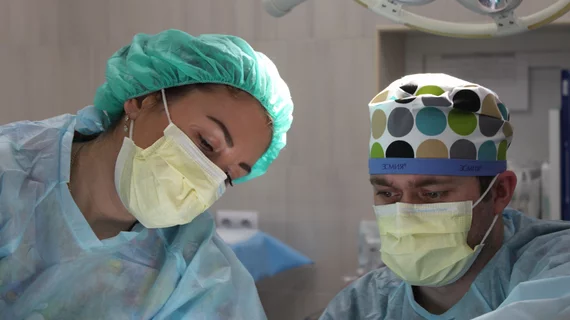Mitral valve repair: How a minimally invasive approach compares to conventional surgery
Minithoracotomy, a minimally invasive procedure for treating degenerative mitral regurgitation, is associated with one-year outcomes comparable to conventional surgery, according to a new study published in JAMA.[1]
Sternotomy is the most common treatment option for patients with degenerative mitral regurgitation who require mitral valve repair surgery. It is an invasive procedure, however, and associated with a high complication rate and long recovery times.
The study’s authors noted that minithoracotomy, a video-assisted procedure that does not require sternotomy, is starting to gain momentum in some parts of the world, but utilization has been far from consistent.
“Uptake of minithoracotomy is variable, with low rates in the U.S. and the U.K., but high rates in Germany,” wrote lead author Enoch Akowuah, MD, a cardiothoracic surgeon with Newcastle University, and colleagues. “Variation is attributable to the absence of high-quality evidence from randomized clinical trials demonstrating equivalent or superior benefits compared with sternotomy. There are also concerns that the increased technical complexity of minithoracotomy may impair the ability to repair complex valve lesions or increase perioperative complications, particularly vascular injuries and stroke. Consensus documents and recent guidelines have recommended that a high-quality trial is required to address this uncertainty.”
Akowuah et al. examined data from 330 patients who presented with degenerative mitral regurgitation from November 2016 to January 2021. The mean patient age was 67 years old and 30% were women. Patients were randomized to either undergo minithoracotomy or full surgery with sternotomy.
Overall, the minimally invasive treatment option was comparable, but not superior, to full surgery with sternotomy. Changes in physical function from baseline after 12 weeks and valve repair rates were similar in both groups. Echocardiography following treatment helped researchers confirm these findings.
Quality of life scores were also similar between the two treatment groups. In addition, the mean cardiopulmonary bypass time was nearly 33 minutes longer among patients treated in the minithoracotomy group, though minithoracotomy was linked to a reduced median length of stay (5 days vs. 6 days).
“The trial addresses a major area of uncertainty in cardiac surgery and a topic that has been identified as a research priority by participants,” the authors wrote. “The importance of identifying the best surgical approach is especially pressing as new percutaneous treatments for degenerative mitral regurgitation emerge.”
Akowuah originally presented these findings at the American College of Cardiology’s annual meeting, ACC.23 Together with the World Congress of Cardiology, as a late-breaking clinical trial. The full study was published in JAMA on Tuesday, June 13, and can be read here.

